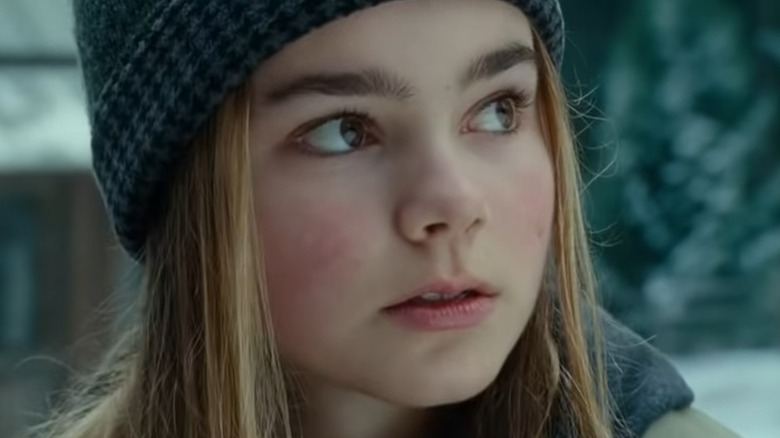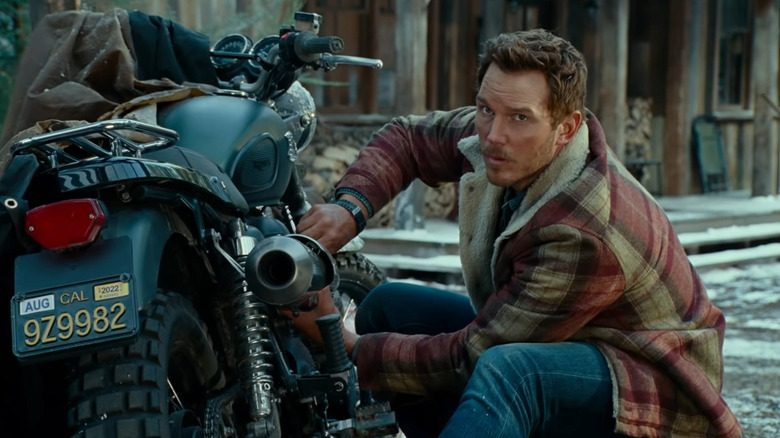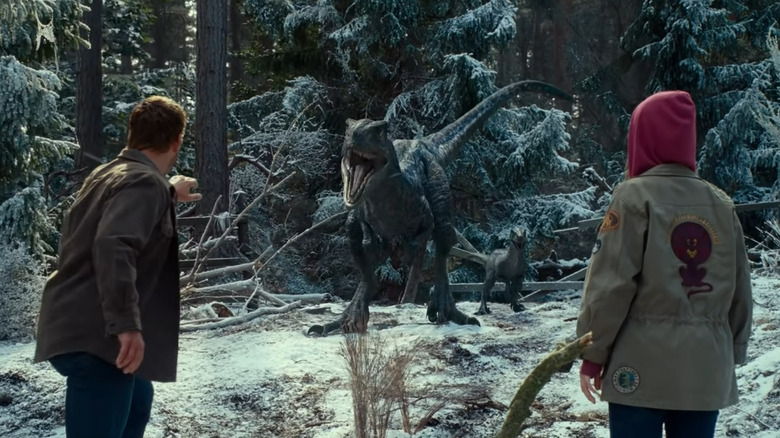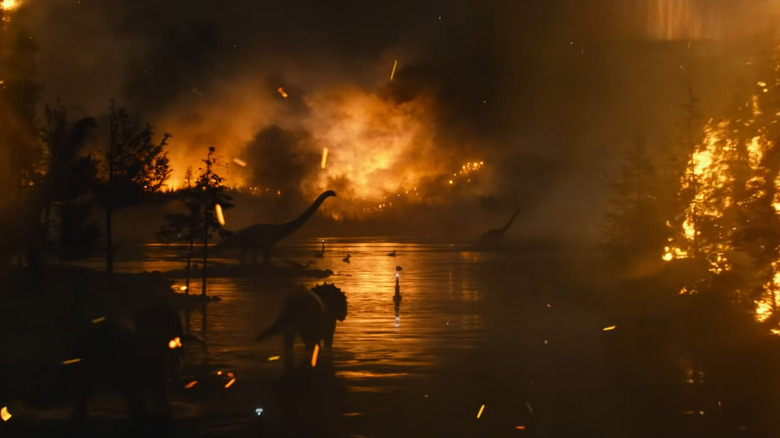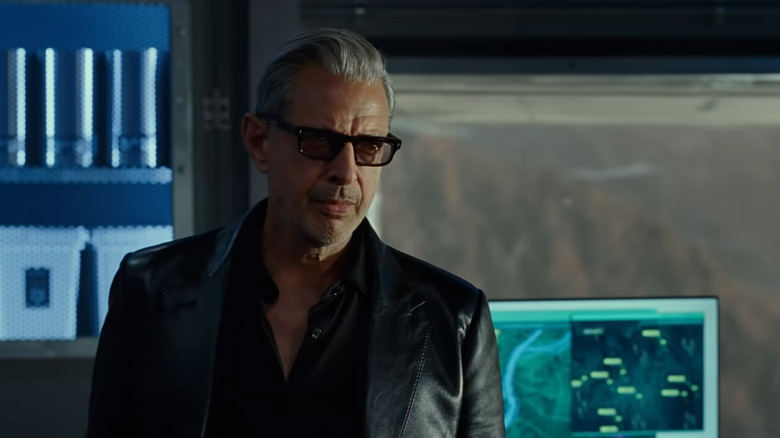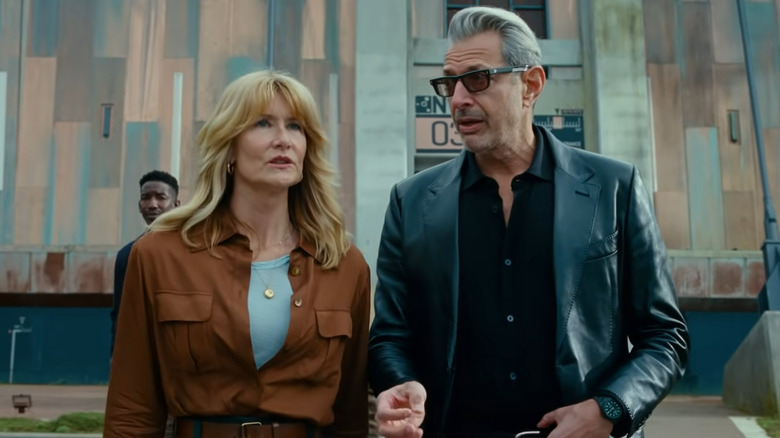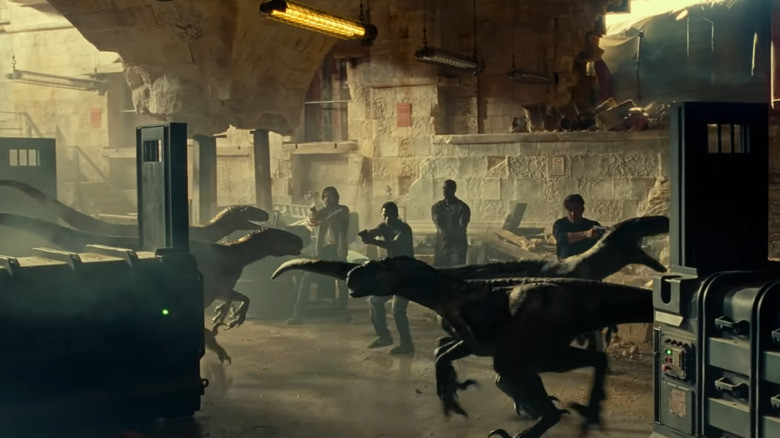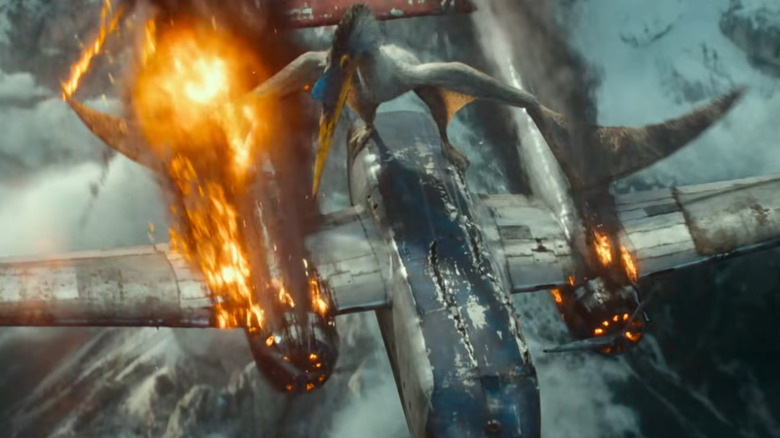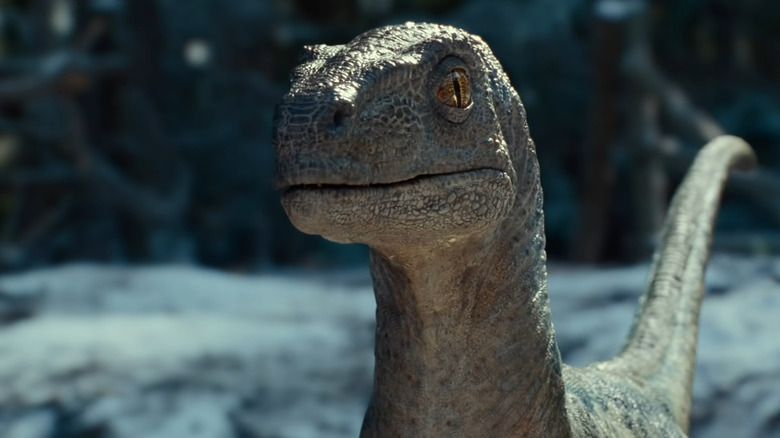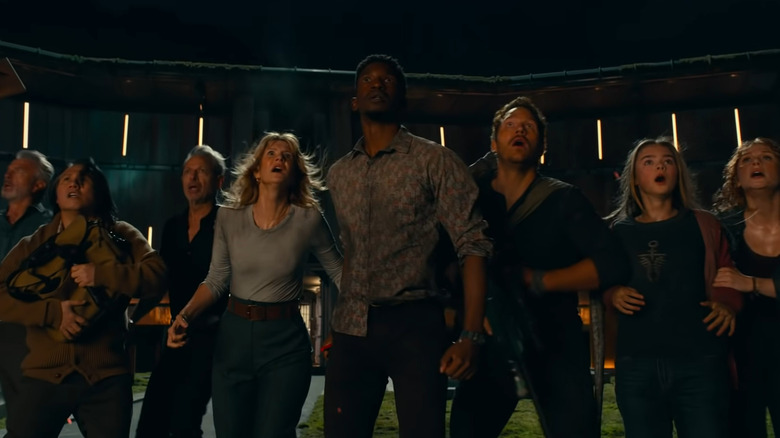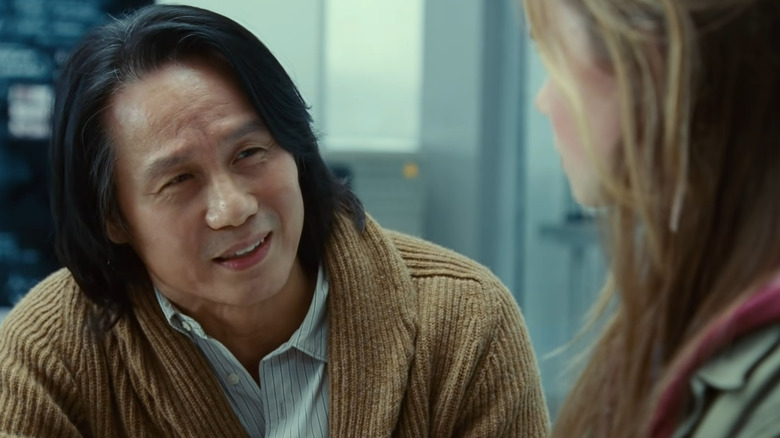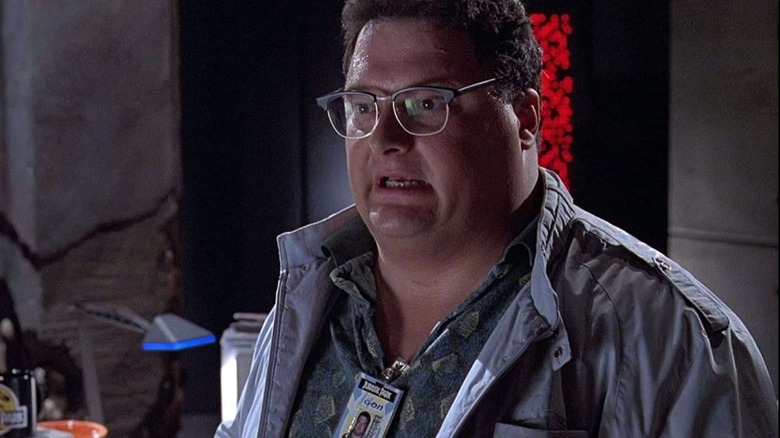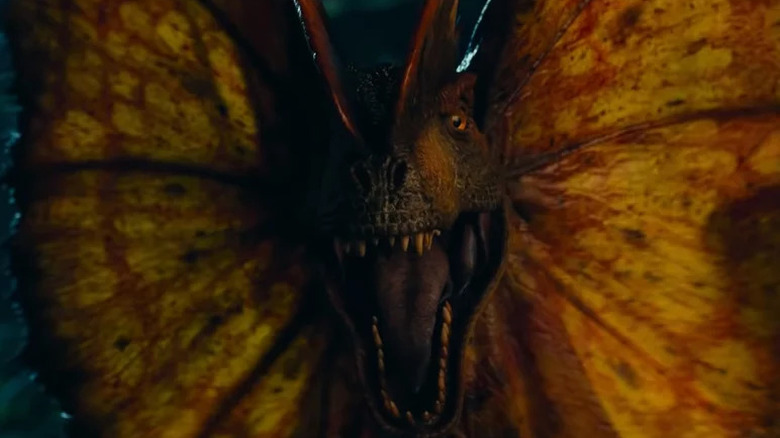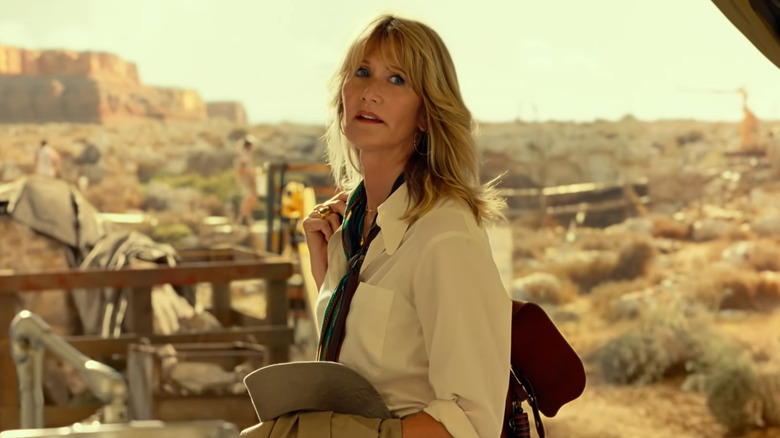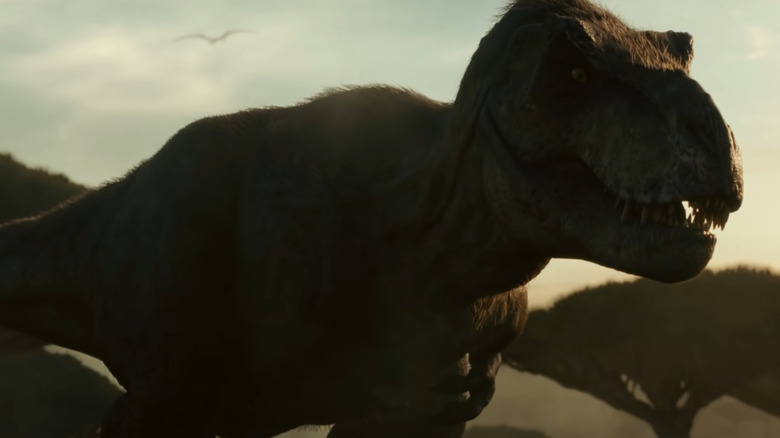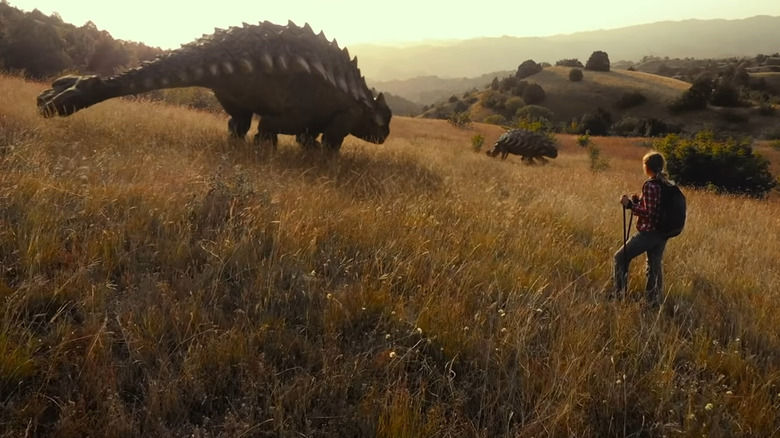Things In Jurassic World Dominion That Make No Sense
There's no nice way to say this: "Jurassic World Dominion" is a mess. From the lazy writing and the nonsensical plot lines to the lack of creativity in the big action set pieces, it's a movie that falls woefully short of its prehistoric potential. A lot of the movie's biggest problems come from the fact that it just doesn't make much sense. Its 147-minute runtime is filled with convenient coincidences, baffling decisions, and storylines that prove far more confusing than satisfying.
That's not to say that the movie is without merit. There are a lot of dinosaurs, and most of them look great. The film has a number of solid character moments too, especially when Sam Neill, Laura Dern, and Jeff Goldblum are all on screen together, and DeWanda Wise's Kayla character is a fantastic addition to the series' ensemble. Unfortunately, these occasional bright spots aren't enough to save the movie from itself. Even when compared to the worst of the "Jurassic Park" movies, "Dominion" doesn't shine much brighter.
Still, there's a certain kind of fun to be had in a silly action blockbuster like "Dominion," even during its most baffling moments. And make no mistake, this movie has a bunch of them. Here are all the things in "Jurassic World Dominion" that make no sense.
How did Maisie stay secret for so long?
At the beginning of "Jurassic World Dominion," Maisie Lockwood (Isabella Sermon) is basically the most sought-after human on the planet. Yet she's somehow managed to survive for four years while living anonymously with Owen (Chris Pratt) and Claire (Bryce Dallas Howard). This is baffling for a few reasons, but perhaps most glaringly because Maisie is so easily caught once the story demands it. All it takes is a few angry-looking guys in a truck. Sure, we're told that she's been going farther out on her own lately, which is bound to draw more attention, but what was stopping Scott Haze's insanely named Rainn Delacourt from just walking into Owen and Claire's house one day while Maisie's there alone?
For that matter, how has it taken four years for Maisie to be found? Her face is on national TV and all over the internet, and her adoptive parents are two of the most notable dino experts in the world. Neither of them are keeping a low profile, so what gives? Surely the government has come knocking at some point in the last four years. Do they hide Maisie in the root cellar? Is the FBI just dumb? And for that matter, what's Owen's actual job?
At some point, you just have to accept that Maisie stays hidden because the story demands it, and she's found when the story demands it. Besides, once the action starts, you'll probably forget all about this little plot hole.
Promises to dinosaurs
In "Jurassic World Dominion," Chris Pratt makes a promise to a dinosaur. It's a writing choice that's made fun of later in the film, but that doesn't stop it from being treated incredibly seriously most of the time. As cute as it is to have a Velociraptor as a dog, and as admirable as Owen's relationship with the natural world is, this is still supremely dumb. Making a promise to a dinosaur makes no sense.
Or rather, a dinosaur understanding the concept of a promise makes no sense. Owen's line is silly enough on its own, but that goofiness is magnified exponentially by the fact that Blue actually seems to understand what he's saying. She accepts that he'll save her baby and doesn't even try to pursue Beta after being fought off once. Why would she? After all, Owen made a promise, so everything's going to be okay.
The fact that Ian Malcolm makes fun of Owen later in the movie for this exact reason doesn't make it any better. If anything, it shows that the writers knew how preposterous a plot point it was, and yet they included it anyway. Yes, Velociraptors are smart, and Blue is a particularly smart one. But opening doors and making agreements are two entirely different things.
Dodgson's locust plan
One of the most bizarre writing choices in "Jurassic World Dominion" is that the global presence of wild dinosaurs — the phenomenon built up in both the intro and the prior movies — isn't even the main issue. Instead, the whole film ends up being about Biosyn's genetically engineered giant locusts, whose insatiable appetites are threatening a worldwide famine. It's strange enough that so much of the story centers on the locusts, but it's even stranger that Biosyn's plan for the locusts doesn't add up.
Theoretically, Biosyn CEO Lewis Dodgson (Campbell Scott) wants to use his locusts as a sort of bioweapon to make the world dependent on his company's enhanced crops. However, that's really just a theory, as the movie never fully explains what Dodgson means to happen. We learn from Dr. Henry Wu (BD Wong) that the locusts wind up being far more resilient and aggressive than intended, but that doesn't spark any change in Dodgson.
How, with all of the advanced labs and technology available, do they not know how the locusts are going to behave? For that matter, why doesn't Dodgson care about the coming apocalypse? He presumably is doing the whole locust thing for money, but he later says that "money is cheap." So why do it all? How was it supposed to work? None of these questions are answered in "Dominion," making the whole overarching story feel confusing and underdeveloped.
Why does Ian Malcolm work for Biosyn?
Ellie Sattler gets tipped off that Biosyn is behind the whole giant locust thing from none other than Ian Malcolm, who's been working for the genetics corporation for some time. Here's the thing — why? Maybe he joined as a self-appointed watchdog, specifically so that he could catch corrupt practices like the ones seen in the film. But he sure doesn't act like a guy trying to save the world. Malcolm holds the same dour and pessimistic perspectives that he's always had, and his frustrations with Dodgson seem as motivated by his own ego as anything else.
Maybe it's the money. Maybe its the standing he gets in the public eye. Or maybe he's just bored. But even with all of those possibilities, Ian's job at Biosyn just feels off. He's spent the majority of the "Jurassic Park" movies railing against genetics companies like InGen and Biosyn, and he's had plenty of traumatic experiences tied to dinosaurs of all sizes. So why leave his kids and fly halfway around the world to live in the Dolomites with a bunch of people he despises?
Again, there are ways to explain this, but the movie makes no effort to do so. Malcolm works for Biosyn because he has to be in the story; because he has to reunite with Ellie and Alan Grant. It's a writing choice that's made strictly for fan service, which is fine, but the film doesn't even attempt to hide that fact.
Ian Malcolm's opening speech
So Ian Malcolm works at Biosyn, which makes no sense, but fine, let's go with it. What's his job at the company? From what's shown in the movie, it seems to consist of giving vague and uninspiring undergraduate lectures to — students? Employees? — then walking around and casually roasting everybody around him. On second thought, maybe Malcolm taking the job makes sense after all. For the price he's surely being paid, that's a pretty sweet gig.
Sadly, no Christmas bonus or luxurious benefits package can make up for how lackluster and nonsensical Malcolm's opening speech in "Jurassic World Dominion" is. Alan and Ellie walk in on him lecturing to a room full of impressionable young minds (again, this is not a college campus) about the dangers and responsibilities inherent to "genetic power." Is this mandatory training? Optional programming? A state-mandated reminder that making dinosaurs is, nine times out of 10, a bad idea? No one knows, but the listeners sure seem to care a lot, as they erupt into thunderous applause upon Malcolm's winding road of a conclusion.
Therein lies the most nonsensical element of this entire scene. Ian Malcolm, the man who made "the building of a dam" sound almost apocalyptic in "Jurassic Park," is rambling and dull here. It's a painfully obvious attempt to create a monologue on par with his old classics, but it comes off sounding like it was written by an angsty teenager who once had "Jurassic Park" described to them thirdhand.
Santos' Atrociraptor attack
One character who doesn't get a ton of screen time in "Jurassic World Dominion" is Soyona Santos, an agent of Biosyn played by Dichen Lachman. Lachman does a strong job and provides a memorable antagonist for the film's second act, but nothing about Santos' operation in Malta is logical.
To be fair, she chooses Malta as a drop-off point because of the city's preexisting dino black market. But why bring the company's four trained Atrociraptors — some of Biosyn's most valuable assets — on a mission that's supposed to be just a simple hand-off? Are dinosaurs really the best security measure when you can buy all the mercenary muscle you want?
Also, why is there an extended layover in Malta to begin with? It's clear that Kayla has flown directly to and from the Biosyn sanctuary in the Dolomites multiple times — she's on a first-name basis with the company's air traffic controllers. Why not just have her fly Beta all the way there? Because they don't trust her? Then why hire her at all?
Even once the action breaks out — the only discernable reason that any of this shoddy writing exists — things don't make sense. Why does Santos tell the raptors to go after Owen and Claire when she herself is being held at gun point? And why does she give up so much information so easily to Claire, a person who, for all her admirable qualities, is neither intimidating nor a killer? It just doesn't add up.
The plane crash
When talking about dinosaur behavior, it's tough to say with definitive authority what does and doesn't make sense. After all, we really don't know how the creatures behaved in their time, so there's a lot of guesswork involved. But even so, it's hard not to view the plane crash scene over the Dolomites in "Dominion" as incredibly contrived.
For starters, why does the Quetzalcoatlus attack Kayla's plane so quickly and viciously? Sure, it's a foreign object hurtling through the dino's sky, but that doesn't necessarily mean it demands to be devoured. But, sure, let's go with the fact that the Quetzalcoatlus does attack the plane. The events that follow are baffling to say the least. Claire ejects over the dinosaur sanctuary and is nearly mauled mid-air by another winged beast. She survives — unlikely, but believable. Then Owen and Kayla attempt a crash landing on what ends up being a frozen lake. They both survive, and the plane stays perched on the surface of the ice without breaking through. Again, sure, let's go with it.
But then the mere pressure of Owen and Kayla walking across the ice starts to crack it. The effect is aggravated by the appearance of a pyroraptor, whose pursuit fully breaks the ice. That's where things go from implausible to nonsensical. Why does a little running completely shatter the ice, but a full-blown plane crash does nothing? Because then we wouldn't get yet another dino chase, of course.
Why does Biosyn want Maisie and Beta?
As described in the movie, this is Biosyn's evil plan: Create swarms of massive locusts to devour all crops that aren't made by the company, thereby bolstering demand; accidentally make the locusts too strong and feel regret; apprehend Maisie and Beta to figure out how to weaken the locusts and undo the mistake. Except that last part isn't really Biosyn's plan. It's Henry Wu's plan, and one that Lewis Dodgson vehemently opposes. So why does Dodgson use so many resources getting Maisie and Beta back? The only reason that's ever given for their capture is fixing the locusts, which Dodgson doesn't want to do. So why does he try so hard to get them?
Maybe the eccentric tycoon just thinks it would be neat to have a human clone around. To be fair, it probably would, albeit in a pretty morally vacant way. But if Dodgson doesn't want Dr. Wu to kill the locusts, why does he bring him the two things he needs to do just that? And for that matter, what role does Beta play in any of Wu's work? He says that she's a perfect biological copy of Blue, which is, again, neat, but he never really explains why he needs her when he already has Maisie. The whole thing feels like an awkward contrivance to put a cute baby dinosaur in the movie. But while Beta may be adorable, she's not enough to obfuscate what lazy writing this is.
Too many coincidences
One of Pixar's 22 rules of storytelling reads as follows: "Coincidences to get characters into trouble are great; coincidences to get them out of it are cheating." Clearly, Pixar didn't make "Jurassic World Dominion."
The number of fortunate happenstances in the movie are enough to comprise a list all their own. Kayla randomly catches a glimpse of Maisie being transported, then randomly meets Claire in a bathroom, then randomly encounters her again when she's on the run from the Atrociraptors. After all that randomness, she decides to provide Claire and Owen with everything they need — a fueled-up aircraft and a pilot who knows exactly how to get to the Biosyn base. Claire and Owen's CIA friend also just happens to know exactly where Maisie's being taken, and he even has a man on the inside.
Once "Dominion" gets all its characters to the Biosyn sanctuary, things get even more far-fetched. We could talk all day about how no prominent characters die in the film, despite there being so many of them and so many more dinosaurs chomping at their heels. We could talk about how Claire air-drops into the sanctuary to find Maisie but is ultimately reunited with her only when Maisie's jeep slides down a hill and lands right in front of Claire. We could talk about so many coincidences — too many for the film's own good. But then we would be talking about "Jurassic World Dominion" all day, and it's hard to think of a worse use of time.
Charlotte Lockwood
A huge portion of the story in "Jurassic World Dominion" revolves around Charlotte Lockwood, the late scientist who cloned herself to create her daughter Maisie. This plot line is flawed from the start because it originated in "Jurassic World: Fallen Kingdom," a movie that hasn't exactly been lauded for its own storytelling. As if in response to the critical pounding "Fallen Kingdom" received, "Dominion" retcons most of the Charlotte and Maisie storyline. It's revealed that it was Charlotte herself who decided to create a clone daughter, not her father as previously believed. "Dominion" also adds that Charlotte died from a rare genetic disease that she worked to heal in Maisie. What a kind and thoughtful gesture.
So why was there ever any confusion around Maisie's origins? Charlotte clearly enjoyed recording video diaries talking explicitly about her cloning project. Were those all just kept under wraps? Why did Charlotte's father never say anything? To protect his daughter's reputation, perhaps? All of this is left open to speculation, which is particularly perplexing given that all of the heavy-handed exposition surrounding Charlotte is delivered posthumously.
It's hard enough to make viewers care about a living character, and it's infinitely harder to make them care about someone who's been dead for years. "Dominion" repeatedly emphasizes just how brilliant Charlotte was — smarter than Dr. Wu, by his own admission — but it ends up feeling incredibly forced, as Charlotte's importance is never mentioned at any prior point in the series. There are secrets, and then there are plot holes.
How does Dodgson have the old Barbasol can?
Towards the end of "Jurassic World Dominion," there's a stray shot in Lewis Dodgson's office that shows the Barbasol can from the first "Jurassic Park." Way back in that movie, Dodgson is the one who commissions Dennis Nedry to steal embryos from InGen, and he gives him the Barbasol can to do it. However, the can is lost when Nedry dies before getting off Isla Nublar. So how did Dodgson get it back?
In Telltale Games' "Jurassic Park: The Game," released in 2011, the main story revolves around various agents searching for the Barbasol can in the wake of the first movie. However, even that doesn't account for the can's appearance in "Dominion." For starters, "Jurassic Park: The Game" is of dubious canon at this point, and second, neither of the game's endings result in the can being recovered.
So the question remains: How did Dodgson get the can back? There are a number of possible explanations, especially given the resources he has at his disposal. But of course, "Jurassic World Dominion" leaves the question unanswered. The real explanation is probably that the writers wanted to include a fun Easter egg — never mind if it makes any sense.
How does the Dilophosaurus find Dodgson?
Despite appearing pretty relaxed about the chaos he creates, Dodgson does eventually realize it's time for him to get out of Dodge. As his dino sanctuary burns in the distance, he gathers his things and boards the Biosyn facility's internal subway line in attempt to get out. Unfortunately for him, the dinosaurs of "Jurassic World Dominion" have other plans — especially the Dilophosaurus, who give Dodgson a poetic death.
It is admittedly satisfying to see the man who hired Dennis Nedry meet the same grim fate. It completes the circle on the "Jurassic" bad guys, and it brings back one of the series' most fearsome species in a big way. There's just one problem — why are the dinos in the train tunnel to begin with?
To be fair, all the systems in the entire sanctuary are on the fritz due to our heroes' meddling, but it's still odd that the Dilophosaurus would find their way down a well-protected tunnel and encounter the one human hiding there. Are they really so hungry that they follow his scent all the way? Or is the Dilophosaurus simply an agent of fate, sent to deliver the villain his just desserts? Given the information provided, it seems to be the latter.
Why is everybody so chill?
The first "Jurassic Park" is a horror movie where numerous characters die, and where the stakes are always sky-high. As the series has progressed, that horror element has given way to more bombastic action scenes. If you want to switch genres in pursuit of bigger box office returns, so be it. But the transition that the "Jurassic World" movies have undertaken can cause inconsistencies when they harken back to their roots.
This is especially evident in "Jurassic World Dominion." At this point, nearly everyone in the core crew — both members of the original "Jurassic Park" cast and mainstays of the "World" trilogy — has experienced immense trauma at the claws of dinosaurs. And yet, for the most part, everybody seems pretty chill in "Dominion." Sure, they're scared when they're being chased, and they treat the animals with the awe and respect they deserve, but there's hardly any acknowledgement of what these characters have gone through in the past.
In one particularly notable moment, Claire and Ellie discuss the nightmares they each still have after their dino experiences. It's a nice idea — a moment of reflection between the two women — but it feels awkward simply because it's the only time that happens in the entire movie. There's no need to spend hours on a dour PTSD plot line, but "Dominion" takes things a bit too far. It's almost like all these characters realize that they're too valuable to Universal to die.
The T-rex beating the Giganotosaurus
Ever since the Spinosaurus stood victorious over the T-rex in "Jurassic Park III," the franchise has made a point of pitting other prehistoric mammoths against the famous predator. Possibly because of the backlash that "Jurassic Park III" received, the Tyrannosaurus has never lost a dino duel since.
That tradition continues in "Jurassic World Dominion," where Rexy is pitted against the titanic Giganotosaurus. Their battle rages overhead as our human heroes make a break for Kayla's stolen chopper, and for a minute it looks like the T-rex is done for. But, just like in the first "Jurassic World," a series of fortunate occurrences allow her to get a second wind. She then makes a brilliant tactical call to impale the Giganotosaurus on the talons of the nearby Therizinosaurus, who's standing conveniently close by for ... reasons?
It's obviously cool to see Rexy come away with another victory, but that doesn't make the deus-ex-dinosaur any more believable. It's there because it looks neat, and in this case, that's okay. But no, it doesn't make any sense.
The ending of Jurassic World Dominion makes no sense
One of the best parts of "Jurassic World Dominion" is the montage that plays at the very end of the film — a striking collection of shots showing dinosaurs becoming part of Earth's modern-day ecosystem. It's a lovely moment that ends a lackluster film on a strong note, but unfortunately, even this otherwise impressive finale is hindered by some nonsense.
"Dominion" opens with an extended news broadcast about all the turmoil dinosaurs are causing in the wild. People are dying, infrastructure is being destroyed, and a lot of humans understandably don't feel safe. Then the story completely pivots to the giant locust plot line, where it stays for the rest of the run time. After the locust dilemma is dealt with, we get a serene sequence of dinosaurs peacefully coexisting in our world.
The problem here is that "Dominion" acts like something has changed, when in reality, nothing has. As far as the dinosaurs are concerned, the movie ends exactly where it starts, with wild dinos roaming the globe in an age when they're supposed to be extinct. So why does the exact same situation that causes panic and terror in the intro seem so peaceful and beautiful at the end? Not a second of screen time is dedicated to solving the "humans and dinosaurs coexisting" issue, but "Dominion" rushes us toward a happy ending anyway. It's almost as if the film itself loses track of the story it's telling. But hey, so did we.
